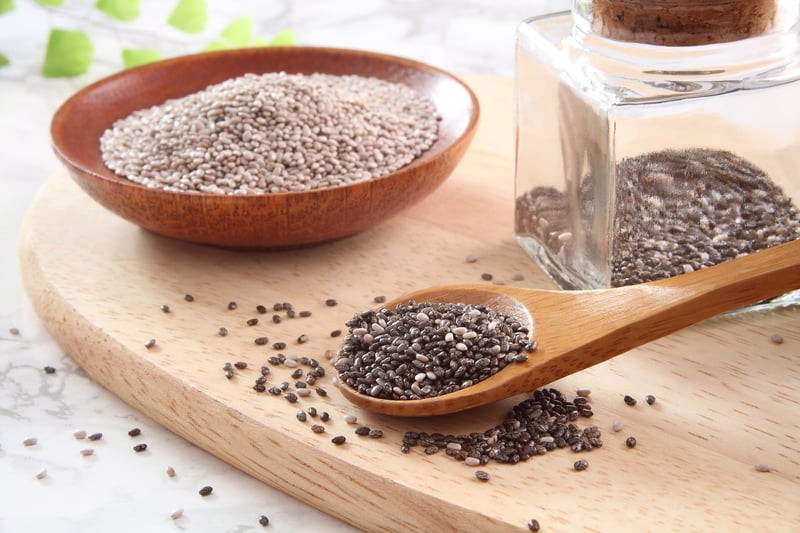5 Health Benefits of Chia Seeds (huge power in a tiny package)

Remember watching the commercials in the ‘80s and ‘90s that started out “ch-cha-ch-chia” for terra-cotta “Chia Pets—The Pottery that Grows”? While they started out with animal shapes, the company is still around and releasing new shapes to this day. But chia seeds actually have an even longer and more fascinating history. Chia, which also goes by the Latin name Salvia hispanica L., is actually a member of the mint family. Its seeds, which are only about 1 – 2mm, can be found in black, gray, black spotted, and white.
And no, chia isn’t just “decorative” with its furry greenery. Chia, it turns out, was used as a food and remedy by the Aztec civilization. It’s also one of the best whole food sources of dietary fiber (10.6 grams per ounce) and the omega-3 fatty acid alpha linolenic acid (5g/ounce). What’s more, chia is a good source of protein. It’s rich in vitamins, minerals (including calcium, magnesium, and iron), and antioxidants (including quercetin and kaempferol).
In other words, despite its tiny stature and comical commercials, this ancient seed packs a serious nutrition punch. Oh, and it’s not contaminated with heavy metals, it’s free from mycotoxins (which is essentially a potentially toxic fungus), and it’s gluten-free. No wonder this featherweight is consistently a prime contender for the top spot as a reigning superfood.
Here are five potential health benefits of chia seeds.
Five Health Benefits of Chia Seeds
Heart Health
With its combination of cholesterol-lowering fiber, heart-healthy omega-3 fats, appetite-satisfying protein, and free-radical-fighting antioxidants, it shouldn’t come as much of a surprise to see the heart health benefits of chia seeds.
In a study published in Diabetes Care, a group of Canadian researchers found study participants who added chia seeds (about 1 ½ ounces per day) to their diets for 12 weeks experienced significant improvements in several cardiovascular risk factors. These included reductions in systolic blood pressure, decreases in inflammation marketers, and support for blood flow and blood clotting.1
And that’s just the tip of the ol’ iceberg. As you’ll see, chia seeds may have a beneficial effect on several other variables that impact heart health.
Glycemic Control and Appetite Management
When it comes to managing blood sugar and improving appetite control, fiber and protein are highly beneficial. For instance, fiber slows gastric emptying, digestion, and absorption of glucose. This results in a slower release into the bloodstream. Through different mechanisms, protein has also been shown to lower the glycemic response to a meal. Likewise, both fiber and protein are well-known for increasing satiety (or feelings of fullness), decreasing hunger, and reducing caloric intake.
In a study published in the European Journal of Clinical Nutrition, researchers found adding chia seeds to white bread significantly reduced the glycemic response.2 Not surprisingly, they found more chia seeds resulted in a lower rise in blood sugar. What’s more, the chia seeds resulted in a significant reduction in appetite in the hours after the meal.
The same group of researchers found adding chia seeds to a sugary beverage substantially reduced the glycemic response. The effect was even more pronounced than when flaxseed was added.3 What’s more, the addition of chia seeds significantly reduced hunger and overall appetite. Once again, these health benefits of chia seeds were greater than with flax. Finally, in a 12-week study, these researchers found daily consumption of chia seeds resulted in a significant reduction in HbA1c, an indicator of long-term glycemic control.1
Digestive Health
Tired of hearing about fiber yet? Hopefully not. Clearly, chia’s a nutrition all-star with wide-ranging health benefits. Perhaps above all, dietary fiber is known for its association with digestive health.
Dietary fiber promotes digestive health through its effects on laxation, fermentation, and effects on the gut microbiota.4 Yet, most people don’t consume nearly enough. In fact, the average American gets only about 17 grams of fiber per day. Compare that to the recommended 25g/day for women and 38g/day for men. You can see most people fall WELL short. And with over 10 grams of fiber per 1-ounce serving, one of the greatest health benefits of chia seeds is its fiber density.
Weight Loss
Given its nutritional profile and effects on appetite and glycemic control, it seems pretty reasonable to think chia seeds can help with weight loss. Well, that’s exactly what researchers from Canada speculated. In a recent study, participants who added chia seeds (~3 – 4 tablespoons/day) to a reduced-calorie diet for 6 months lost over 6 times more weight than a control group, which otherwise followed the same diet.5
What’s more, the diet group that added chia seeds experienced a 3-fold greater reduction in waist circumference—a significant reduction in belly fat. And like previous studies, the chia seed group experienced significant reductions in C-reactive protein. They also saw a significant increase in the hormone adiponectin, which is closely tied to insulin sensitivity, fat burning, and satiety.
As exciting as that sounds, other studies haven’t found such promising results.6 The take-home point is that chia seeds might help with weight loss when combined with an overall healthy reduced-calorie diet. Just don’t expect them to be some sort of magic seed.
Cha-Cha-Cha-Chia!
With its healthy dose of fiber, healthy fats, antioxidants, vitamins, minerals, and protein, this ancient seed packs quite the nutritional punch. And the addition of chia seeds to an otherwise healthy diet may result in several promising health benefits. Even better, it’s easy to incorporate this tiny seed into your diet. To boost the health benefits of chia seeds, here are just a handful of ideas:
- Add to smoothies
- Sprinkle on yogurt and oatmeal
- Sprinkle on soups and salads
- Incorporate into baked foods
- Make a chia pudding
Just don’t leave it sitting on a shelf only as part of your favorite Chia Pet.







